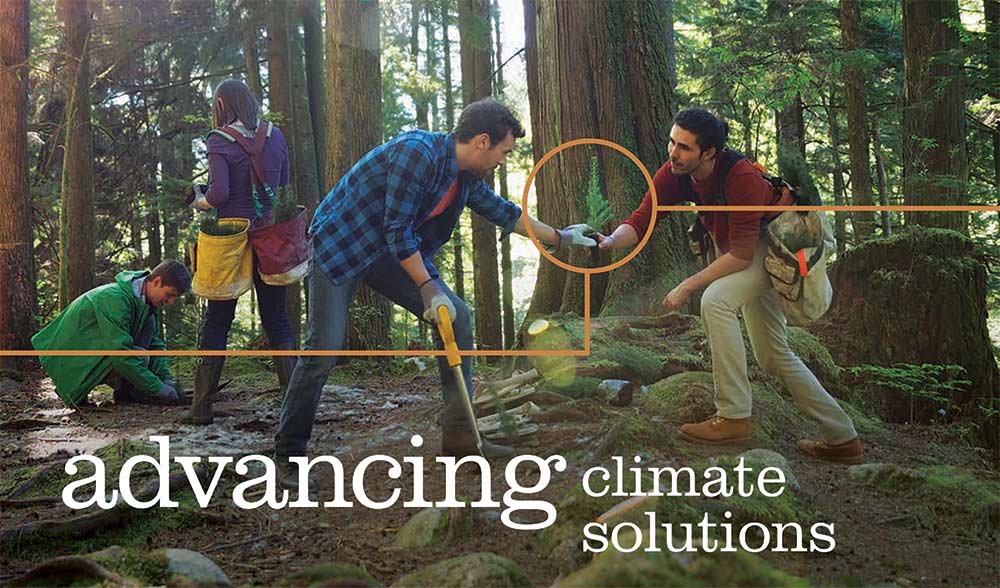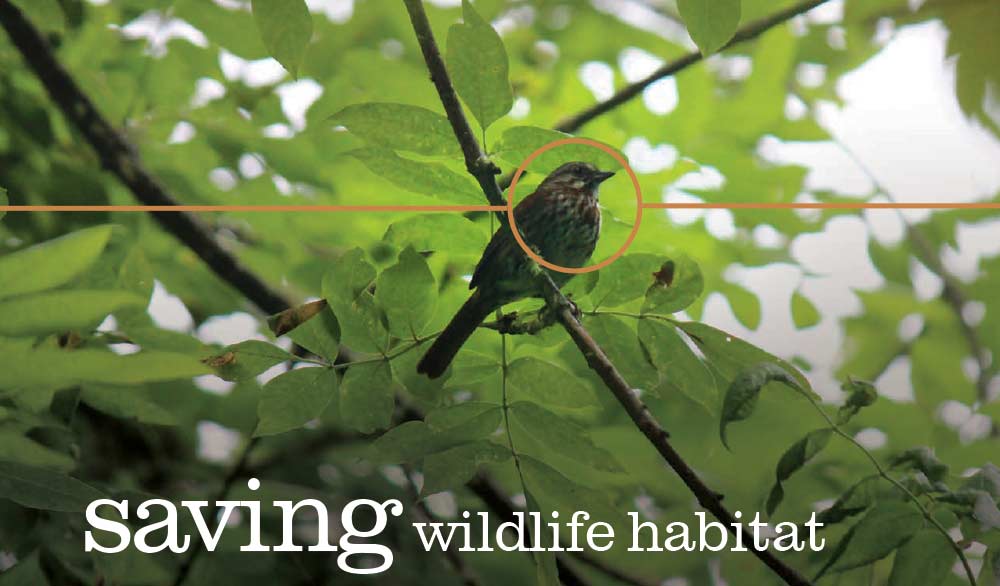
In 2018, climate-driven disasters hit home, hard. The extent and impact of 2018’s fires dwarfed even those of 2017. Lives were lost and smoke filled the air for months. Major health and economic impacts will be felt for years. But, out of this devastation, there is hope. 2018 illustrated the reality of climate change like never before, spurring unprecedented action and commitment. While 2018 was in many ways a devastating year, PFT made significant progress to protect our climate, water, and wildlife. Find out more in the Pacific Forest Trust 2018 Annual Report.
View or download the 2018 Annual Report as a PDF, or read the full text below.
bridging 25 years of…
In 2018, climate-driven disasters hit home, hard. The extent and impact of 2018’s fires dwarfed even those of 2017. Lives were lost and smoke filled the air for months. Major health and economic impacts will be felt for years. But, out of this devastation, there is hope.
2018 illustrated the reality of climate change like never before, spurring unprecedented action and commitment. The October IPCC report was blunt, underscoring the absolute necessity of significant action in the next few years. Scientists warned that these are probably the most important years in our history if we are to preserve a livable, recognizable world.
We have five to ten years to change our carbon emissions trajectory to prevent irreversible, cataclysmic changes by 2040. We have met extraordinary threats with extraordinary responses before. Responding to the threats of World War II, the US and allies made heroic, systemic changes to keep the world safe. It is possible.
We have a well-tested, powerful technology to help us: the original, clean, green technology of Nature, especially forests. The IPCC and the US National Academy of Sciences make it clear—reducing and reversing emissions by restoring and conserving forests and other lands is a necessity.
The regrowth of forests in the Americas resulted in the global cooling of the Little Ice Age. Imagine doing that intentionally: vibrant, resilient forests capturing carbon from sea to shining sea, cooling the planet. Our future and our forests’ future are entwined.
At PFT, we are committed to meeting this global climate challenge. Join us!
Sincerely,
Laurie A. Wayburn

Advancing climate solutions
Reducing forest loss, Restoring forest carbon richness, and Reforesting former forests— our three “Rs”—are the building blocks of PFT’s work to combat climate change. While 2018 was in many ways a devastating year across the West Coast, we made significant progress on climate. Throughout the year, PFT provided extensive input that was incorporated into state-level plans, legislation, and action.
California began acting at a scale that approaches what’s needed, with the state investing more than $1 billion over the next five years in restoring forest resilience and protecting forests. The Air Resources Board highlighted that the natural and working lands (NWL) sector would be key to achieving Governor Jerry Brown’s executive order to make the state carbon neutral. Key elements PFT championed in this effort include significantly increased investments to restore safer, more natural fire regimes as well as more efficient processes for forest restoration.
PFT also encouraged regional collaboration by holding and presenting at a number of events, including at the Global Climate Action Summit. PFT’s event brought climate leaders from California, Oregon, and Washington together to discuss collaboration to mitigate climate change through forests. Thereafter, California and Washington signed an MOU to cooperate on climate action through forests; the province of British Columbia signed on in December, pledging to share information and work jointly to improve forest resilience and carbon richness.
In 2018, the California Climate Investments (CCI) program served as a powerful model of how states can leverage investments in forests for multi-benefit outcomes. Funded through the CCI, PFT partnered with Michigan-California Timber Company (MCTC) to permanently conserve the 5,006-acre Black Butte Working Forest, located near the iconic cinder cone between the cities of Weed and Mt. Shasta in Northern California. CAL FIRE invested more than $5 million in this project because of its values for climate, fuels reduction, and the local economy, as well as for wildlife habitat.
Saving wildlife habitat
Our changing climate is increasing stressors on wildlife habitats and is forcing many species to move. Connecting and protecting habitats, restoring existing habitats, and building bridges to future habitats that will be safe havens for wildlife is vital to ensuring many species’ survival. With easements at both McCloud Soda Springs and Black Butte completed in 2018, PFT now holds easements on more than 40,000 acres of land in the critical Mt. Shasta Headwaters area, linking habitat for many important and threatened species across hundreds of thousands of acres in the state’s most critical climate change refugia.
The 1,346-acre McCloud Soda Springs Working Forest provides habitat for beavers, bears, willow flycatchers, northern goshawks, and redband trout. Conservation-minded landowner Schroll Timberlands purchased this land in 2015 to protect it from development and keep it as a working forest. After more than a century in timber production, the rich, productive forest stands on this highly developable property will now be managed to restore their natural diversity and enhance habitat values, especially for wildlife that need older forests with big trees, large limbs, and furrowed bark or cavities perfect for bats and birds, among other creatures.

Our first C. Searle Whitney Scholar, Emily Leung, did an assessment of bird species in 2018 as part of a comprehensive wildlife survey in our Van Eck Oregon Forest. We are grateful for Searle’s enduring legacy of generosity for our work advancing natural forest management benefiting wildlife and sustaining rural communities.

Protecting key water sources
When we think of water supplies, we often think of dams and pipes, the gray infrastructure of a water system. But the water originates somewhere else: the crucial green infrastructure of forested watersheds. PFT takes a twinned approach to protecting water sources: direct conservation, and innovating new policies and approaches that incentivize their protection and restoration.
In 2016, PFT sponsored legislation that integrated source watersheds into California’s water system infrastructure, providing both a new approach to comprehensively addressing watershed issues, and potential pathways for funding and financing their conservation. In 2017, PFT completed a first ever assessment of the health and condition of the five key watersheds in Northern California that provide drinking water for more than 28 million Californians as well as for the majority of the state’s prime irrigated agricultural lands. (Read it at pacificforest.org/risk.) In 2018 we worked with partners including Earth Economics, water agencies, and regional land managers to document current investments in watershed function (more info at pacificforest.org/price), establish the scale of investments needed to ensure these watersheds’ resilient function and gain passage of legislation calling for the state to develop an actionable, spatially explicit implementation plan. This will enable the state to roll out a comprehensive watershed restoration and conservation program pioneering a new, climate-smart approach to ensure water security for a changing California.
On the ground, the conservation projects PFT completed in 2018 will have a tangible effect on watershed function in these key source watersheds. Soda Spring and Boy Scout Springs are two large spring complexes at the McCloud Soda Springs property that feed the McCloud River. PFT is working alongside the beavers there to restore the rare wet meadows, the natural reservoirs that help regulate the amount of water flowing into forest creeks, preventing flooding in the spring and drought in the summer.
In a hotter, drier world, forest watersheds need our help and we need theirs, to keep supplying our water. Drought, extreme wildfire, misguided management, and poorly maintained roads—as well as residential and other building in key watersheds—threaten our source springs.
We’re building support in both the public and private sectors to leverage new investments in the conservation of these crucial sources of water. As part of this, we’ve launched the Springs for Life™ ForestWater Alliance™, a new partnership opportunity for companies committed to protecting and restoring these crucial water sources, benefitting communities, farmers, fish and wildlife. Find out more at springsforlife.net.
…growing
2018 was an exciting year for PFT’s work in Oregon, expanding our programs and opening our Portland office. With the generous support of the Advancing Conservation Excellence (ACE) program of the Land Trust Alliance and the Ned and Sis Hayes Family Fund, among others, PFT is able to significantly increase its work advancing climate policy, working forests conservation, and diversification of a sustainable forest economy.
Thanks for your support for Pacific Forest Trust!
We’ve been successful for more than 25 years in protecting forests for all their benefits, but only with the help of dedicated people like you who understand the value of forests to our economy, clean water, wildlife, and our climate. Please make a contribution today.


